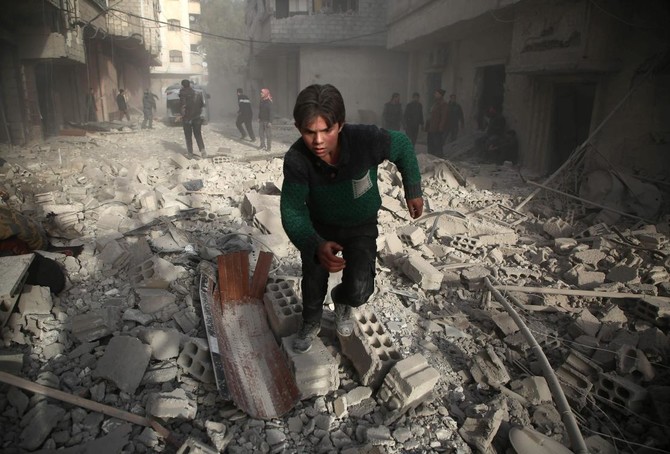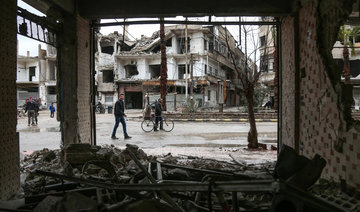DAMASCUS: Hanan anxiously waved goodbye as her 11-year-old daughter headed into class in Syria’s capital after more than a week at home under escalating rebel shellfire.
“I can’t describe my anxiety from the moment Lina leaves for school, until she returns. It’s like she’s coming back from some adventure or battle, not from class,” the 44-year-old mother told AFP.
Hanan lives with her husband and three daughters in Al-Amin, a neighborhood at the heart of Damascus’s Old City which has been bombarded by rebels entrenched outside the capital.
Fighting between government troops and rebels escalated during the second week of February, forcing nearly a dozen schools in the Old City to shut for several days and prompting terrified parents to keep children at home.
Hanan kept her daughters out of school for eight days. On Sunday, she woke up and checked a Facebook page called “Daily Mortar Strikes — Damascus” to see where shelling had hit overnight.
Nervously, she sent her daughters off to class, personally accompanying Lina on the 10-minute walk to Josephine’s Girls School.
“Today was better. We woke up to our alarms instead of explosions,” she said.
The walk to school has become so dangerous that Hanan said she would rather keep Lina at home.
“It’s better that my daughter loses a year of school than lose her life, or that I lose her,” she told AFP.
Although it has been relatively insulated from the mass destruction wreaked on other Syrian cities, Damascus is regularly bombarded by armed opposition factions based in nearby Eastern Ghouta.
Syrian troops have recaptured most rebel positions around the capital in recent years, and are determined to clear the final pocket in Eastern Ghouta.
Government forces intensely bombarded the enclave for five days earlier this month, killing dozens, as rebel rockets and mortars on Damascus killed at least 20 people including three children, according to the Syrian Observatory for Human Rights.
The rain of shells has traumatized Damascenes including Fadia, who teaches English to eighth graders at a private school in the Bab Sharqi district.
“We’d hear the sound of shells, we were so scared. Then one of our students, 15-year-old Rita Al-Eid, was killed by a mortar,” Fadia told AFP.
“The next day, most of the classrooms were empty.”
She breathed a sigh of relief last week when her school sent out text messages saying classes were canceled for three days.
“The sound of ambulances didn’t stop at all. Sometimes we had to close the windows just so we could hear the students,” said the 36-year-old.
“Then we’d open them again, scared the glass would shatter if a shell hit nearby.”
Now that shelling has subsided, Fadia’s school will reopen on Monday.
“I think residents will feel safe when they see that schools have opened again,” she told AFP, but admitted she’s still nervous.
“Shells aren’t a game. It’s a matter of life or death — and life in the Old City is directly tied to the situation in Eastern Ghouta.”
A few blocks away in Bab Touma, a handful of public buses stood waiting for passengers to head to the outskirts of the capital.
Driver Abu Mohammad cleaned the glass of his white bus, pausing briefly to point out a crater punched in the pavement by a deadly mortar strike last week.
“We all went home then, but we came back the next day — we have to live, and we have no other choice,” he told AFP.
The unpredictability of the rocket and mortar fire has made Damascus residents afraid to leave their homes, making business slow for bus drivers, said Abu Mohammad, in his fifties.
“Usually on days like this, there are tons of people from early in the morning until late at night. But there are so few people today,” he said.
“No one’s leaving their homes except when absolutely necessary. Death can ride buses, too.”
Braving rebel shelling, students back to Damascus schools
Braving rebel shelling, students back to Damascus schools

Syrian intelligence says it foiled Daesh attempt to target Damascus shrine

DAMASCUS: Syria's Intelligence Directorate foiled an attempt by Daesh to target the Sayyida Zeinab shrine in the capital Damascus, state news agency Sana reported on Saturday.
It said members of the cell were arrested before carrying out an attack.
Lebanon PM arrives in Damascus on first such visit since before Syria war

DAMASCUS: Lebanese Prime Minister Najib Mikati arrived in Damascus Saturday in the first such visit since before civil war broke out in Syria in 2011, an AFP journalist reported.
Mikati’s visit comes as the neighboring countries seek better relations after Islamist-led militants toppled longtime strongman Bashar Assad last month.
Israel strikes Yemen Houthis, warns it will ‘hunt’ leaders

- Israeli military said fighter jets struck military targets belonging to Houthi regime
- It said it also struck military infrastructure in the ports of Hodeida and Ras Issa
JERUSALEM: Israel struck Houthi targets in Yemen on Friday, including a power station and coastal ports, in response to missile and drone launches, and warned it would hunt down the group’s leaders.
“A short while ago... fighter jets struck military targets belonging to the Houthi terrorist regime on the western coast and inland Yemen,” the Israeli military said in a statement.
It said the strikes were carried out in retaliation for Houthi missile and drone launches into Israel.
The statement said the targets included “military infrastructure sites in the Hizaz power station, which serves as a central source of energy” for the Houthis.
It said it also struck military infrastructure in the ports of Hodeida and Ras Issa.
Israeli Prime Minister Benjamin Netanyahu, in a statement after the strikes, said the Houthis were being punished for their repeated attacks on his country.
“As we promised, the Houthis are paying, and they will continue to pay, a heavy price for their aggression against us,” he said.
Israeli Defense Minister Israel Katz said Israel would “hunt down the leaders of the Houthi terror organization.”
“The Hodeida port is paralyzed, and the Ras Issa port is on fire — there will be no immunity for anyone,” he said in a video statement.
The Houthis, who control Sanaa, have fired missiles and drones toward Israel since war broke out in Gaza in October 2023.
They describe the attacks as acts of solidarity with Gazans.
The Iran-backed rebels have also targeted ships in the Red Sea and Gulf of Aden, prompting retaliatory strikes by the United States and, on occasion, Britain.
Israel has also struck Houthi targets in Yemen, including in the capital.
Since the Gaza war began, the Houthis have launched about 40 surface-to-surface missiles toward Israel, most of which were intercepted, the Israeli army says.
The military has also reported the launch of about 320 drones, with more than 100 intercepted by Israeli air defenses.
West Bank family wants justice for children killed in Israel strike

- Israeli troops or settlers have killed at least 825 Palestinians in the territory, according to Health Ministry figures
TAMMUN, Plestinian Territories: Batoul Bsharat was playing with her eight-year-old brother Reda in their village in the occupied West Bank. Moments later, an Israeli drone strike killed him and two of their cousins.
“It was the first time in our lives that we played without arguing. It meant so much to me,” the 10-year-old said as she sat on the concrete ledge outside the family home in the northern village of Tammun where they had been playing on Wednesday.
At her feet, a crater no wider than two fists marked where the missile hit.
The wall behind her is pockmarked with shrapnel impacts, and streaks of blood still stain the ledge.
Besides Reda, Hamza, 10, and Adam, 23, were also killed.
The Israeli army said on Wednesday that it had struck “a terrorist cell” in Tammun but later promised an investigation into the civilian deaths.
Batoul puts on a brave face but is heartbroken at the loss of her younger brother.
“Just before he was martyred, he started kissing and hugging me,” she said.
“I miss my brother so much. He was the best thing in the world.”
Her cousin Obay, 16, brother of Adam, was the first to come out and find the bodies before Israeli soldiers came to take them away.
“I went outside and saw the three of them lying on the ground,” he said. “I tried to lift them, but the army came and didn’t allow us to get close.”
Obay said his elder brother had just returned from a pilgrimage to Makkah.
“Adam and I were like best friends. We had so many shared moments together. Now I can’t sleep,” he said, staring into the distance, bags under his eyes.
Obay said the soldiers made him lie on the ground while they searched the house and confiscated cellphones before leaving with the bodies on stretchers.
Later on Wednesday, the army returned the bodies, which were then laid to rest. On Thursday, Obay’s father, Khaireddin, and his brothers received condolences from neighbors.
Despite his pain, he said things could have been worse as the family home hosts many children.
“Usually, about six or seven kids are playing together, so if the missile had struck when they were all there, it could have been 10 children,” he said.
Khaireddin was at work at a quarry in the Jordan Valley when he heard the news. Adam had chosen to stay home and rest after his pilgrimage to Makkah.
He described his son as “an exceptional young man, respectful, well-mannered and upright,” who had “nothing to do with any resistance or armed groups.”
Khaireddin, like the rest of the Bsharat family, said he could not comprehend why his home had been targeted.
“We are a simple family, living ordinary lives. We have no affiliations with any sides or movements.”
Violence has soared in the West Bank since war broke out in Gaza with the Hamas attack of Oct. 7, 2023.
Israeli troops or settlers have killed at least 825 Palestinians in the territory, according to Health Ministry figures.
As the Israeli army has stepped up its raids on West Bank cities and refugee camps, it has also intensified its use of air strikes, which were once a rarity.
A day before the Bsharat home was hit, a similar strike had struck Tammun.
Khaireddin regrets that the army made “no apology or acknowledgment of their mistake.”
“This is the current reality — there is no accountability. Who can we turn to for justice?“



















